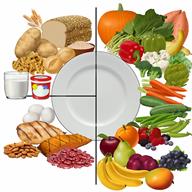ThisisPatientEngagementcontent
Diabetes Mellitus and Nutrition, Adult
To download the Ukraine translated version, please click the link below
Every person with diabetes is different. And each person has different needs for a meal plan. Your health care provider may suggest that you work with an expert in healthy eating called a dietitian. They can help you make a meal plan that's best for you.
Carbohydrates, also called carbs, affect your blood sugar level more than any other type of food. Eating carbs raises the amount of sugar in your blood.
It's important to know how many carbs you can safely have in each meal. This is different for every person. Your dietitian can help you calculate how many carbs you should have at each meal and for each snack.
Alcohol can cause a decrease in blood sugar (hypoglycemia), especially if you use insulin or take certain diabetes medicines by mouth. Hypoglycemia can be a life-threatening condition. Symptoms of hypoglycemia are similar to those of having too much alcohol. They include confusion, being sleepy, and feeling dizzy.
Do not drink alcohol if:Reading food labels
Shopping
Cooking
Meal planning

Fruits
Berries. Apples. Oranges. Peaches. Apricots. Plums. Grapes. Mangoes. Papayas. Pomegranates. Kiwi. Cherries.
Vegetables
Leafy greens, including lettuce, spinach, kale, chard, collard greens, mustard greens, and cabbage. Beets. Cauliflower. Broccoli. Carrots. Green beans. Tomatoes. Peppers. Onions. Cucumbers. Brussels sprouts.
Grains
Whole grains, such as whole-wheat or whole-grain bread, crackers, tortillas, cereal, and pasta. Unsweetened oatmeal. Quinoa. Brown or wild rice.
Meats and other proteins
Seafood. Poultry without skin. Lean cuts of poultry and beef. Tofu. Nuts. Seeds.
Dairy
Low-fat or fat-free dairy products such as milk, yogurt, and cheese.
The items listed above may not be all the foods and drinks you can have. Talk with a dietitian to learn more.
Fruits
Fruits canned with syrup.
Vegetables
Canned vegetables. Frozen vegetables with butter or cream sauce.
Grains
Refined white flour and flour products such as bread, pasta, snack foods, and cereals. Avoid all processed foods.
Meats and other proteins
Fatty cuts of meat. Poultry with skin. Breaded or fried meats. Processed meat. Avoid saturated fats.
Dairy
Full-fat yogurt, cheese, or milk.
Beverages
Sweetened drinks, such as soda or iced tea.
The items listed above may not be all the foods and drinks you should avoid. Talk with a dietitian to learn more.
This information is not intended to replace advice given to you by your health care provider. Make sure you discuss any questions you have with your health care provider.
Cookies are used by this site. To decline or learn more, visit our cookie notice.
Copyright © 2025 Elsevier, its licensors, and contributors. All rights are reserved, including those for text and data mining, AI training, and similar technologies.